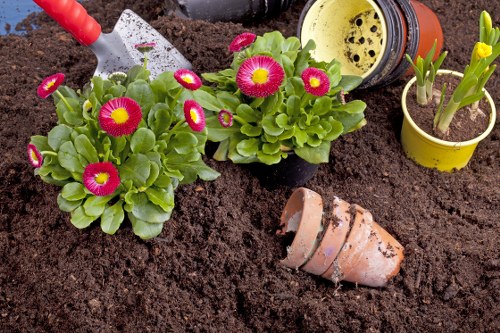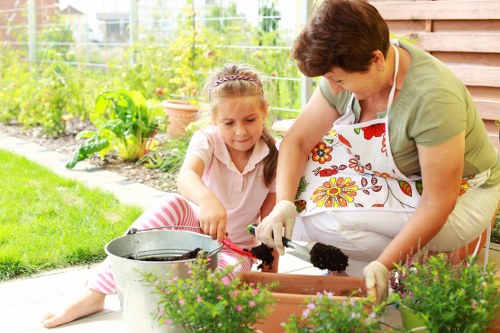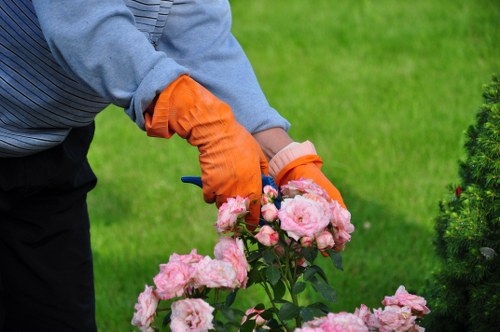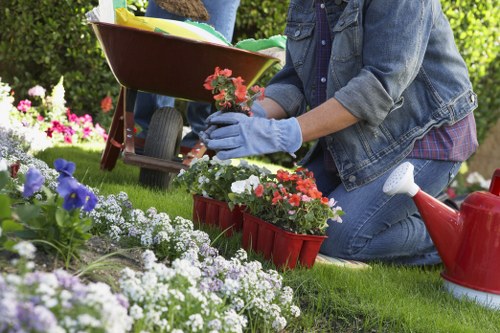Expert Garden Maintenance in Walthamstow

Introduction to Garden Maintenance
Maintaining a beautiful garden in Walthamstow requires dedication, knowledge, and the right resources. Whether you're a seasoned gardener or just starting, understanding the essentials of garden maintenance in Walthamstow can transform your outdoor space into a vibrant oasis.
Walthamstow's unique climate and soil conditions present both opportunities and challenges for gardeners. With the right strategies, you can ensure your garden thrives year-round.
In this comprehensive guide, we'll explore the key aspects of garden maintenance, from seasonal tasks to choosing the right plants, all tailored to the Walthamstow environment.

Seasonal Garden Care
Spring Maintenance
Spring is a crucial time for prepping your garden in Walthamstow. Start by cleaning up any debris left from winter to make way for new growth. Pruning dead branches and removing old mulch can encourage healthier plants.
Planting spring bulbs such as tulips and daffodils can add vibrant colors to your garden. Additionally, it's an ideal time to fertilize your lawn to promote lush, green grass throughout the warmer months.
Don't forget to check your irrigation systems and repair any leaks to ensure your plants receive adequate water as the temperatures rise.

Summer Maintenance
During the summer months, consistent watering is vital. Implementing a drip irrigation system can help conserve water while keeping your garden hydrated. Mulching around plants reduces evaporation and keeps roots cool.
Regular weeding is essential to prevent unwanted plants from competing with your garden's flora. Deadheading spent flowers encourages continuous blooming and maintains the garden's aesthetic appeal.
It's also important to monitor for pests and diseases. Early detection and treatment can prevent significant damage and preserve the health of your garden.

Autumn Maintenance
Autumn is the time to prepare your garden for the colder months. Start by raking fallen leaves to prevent mold and pests. Planting autumn flowers like chrysanthemums can extend the blooming season.
Pruning perennials and cutting back overgrown shrubs helps maintain structure and encourages robust growth in the spring. Additionally, aerating your lawn improves soil health and prepares it for winter.
Protecting tender plants with mulch or protective covers can safeguard them against frost and harsh weather conditions.

Winter Maintenance
Winter garden maintenance focuses on protecting your plants and planning for the upcoming growing season. Clear snow from delicate branches to prevent breakage, and cover vulnerable plants with frost cloths.
This is also an excellent time to plan your garden layout for the next year. Consider crop rotation in vegetable gardens to maintain soil fertility and reduce pest buildup.
Regularly inspect your tools and equipment, ensuring they're clean and in good working condition for spring maintenance.
Choosing the Right Plants
Selecting plants that thrive in Walthamstow's climate is essential for a successful garden. Opt for native species or those well-suited to the local environment to minimize maintenance and increase resilience.
Perennials
- Lavender: Adds fragrance and attracts pollinators.
- Hostas: Great for shaded areas with lush foliage.
- Roses: Classic beauty with a variety of colors and forms.
Annuals
- Marigolds: Bright and easy to grow, perfect for borders.
- Petunias: Versatile with a wide range of colors.
- Zinnias: Long-blooming and attract butterflies.
Vegetables and Herbs
- Tomatoes: Thrive in warm weather with ample sunlight.
- Basil: Perfect companion plant for tomatoes.
- Spinach: Fast-growing and nutritious.
Soil Health and Fertilization
Healthy soil is the foundation of a thriving garden. In Walthamstow, the soil can vary, so it's important to test your soil's pH and nutrient levels regularly.
Soil Testing
Conducting a soil test helps determine the necessary amendments to optimize plant growth. Kits are available at local garden centers, or you can send samples to a laboratory for detailed analysis.
Organic Fertilizers
Using organic fertilizers enriches the soil naturally. Compost, manure, and bone meal are excellent choices that improve soil structure and fertility without harmful chemicals.
Mulching
Applying mulch helps retain moisture, suppress weeds, and regulate soil temperature. Organic mulches like bark, straw, and leaf mold are beneficial for the soil ecosystem.
Pest and Disease Management
Managing pests and diseases is crucial for maintaining a healthy garden. Integrated Pest Management (IPM) strategies offer effective and environmentally friendly solutions.
Preventive Measures
Regularly inspecting plants for signs of pests or diseases allows for early intervention. Encouraging beneficial insects, such as ladybugs and bees, can naturally control pest populations.
Natural Remedies
Using neem oil, insecticidal soap, and other natural treatments minimizes the impact on beneficial organisms and the environment.
Cultural Practices
Proper spacing, pruning, and crop rotation reduce the likelihood of pest infestations and disease outbreaks by improving air circulation and soil health.
Garden Tools and Equipment
Having the right tools is essential for efficient garden maintenance. Investing in quality equipment can save time and effort, ensuring your garden remains well-kept.
Essential Tools
- Pruners: For trimming and shaping plants.
- Garden Fork: Useful for turning and aerating soil.
- Rake: Essential for clearing debris and leveling soil.
Maintenance of Tools
Regularly cleaning and sharpening your tools extends their lifespan and ensures optimal performance. Store them in a dry place to prevent rust and damage.
Advanced Equipment
For larger gardens, consider investing in equipment like lawn mowers, hedge trimmers, and irrigation systems to streamline maintenance tasks.
Creating Sustainable Gardens
Sustainability is increasingly important in garden maintenance. Implementing eco-friendly practices benefits both your garden and the broader environment.
Water Conservation
Efficient watering techniques, such as drip irrigation and rainwater harvesting, reduce water usage and promote sustainability in your garden.
Composting
Composting garden waste recycles nutrients back into the soil, reducing the need for chemical fertilizers and minimizing landfill waste.
Native Plants
Incorporating native plants supports local wildlife and reduces maintenance needs, as these plants are adapted to the regional climate and soil conditions.
Professional Garden Maintenance Services
For those seeking expert assistance, professional garden maintenance in Walthamstow offers tailored solutions to keep your garden in top shape.
Benefits of Hiring Professionals
- Expertise: Professionals bring extensive knowledge and experience to manage your garden effectively.
- Time-Saving: Outsourcing maintenance tasks frees up your time for other activities.
- Customized Care: Services can be tailored to meet the specific needs of your garden.
Services Offered
- Lawn Care: Mowing, fertilizing, and aerating to maintain a healthy lawn.
- Pruning and Trimming: Keeping plants and hedges properly shaped and healthy.
- Planting and Landscaping: Designing and implementing attractive garden layouts.
Choosing the Right Service
Select a reputable garden maintenance company with positive reviews and a portfolio of completed projects. Ensure they understand your vision and can provide the services you require.
Conclusion
Maintaining a beautiful garden in Walthamstow is achievable with the right knowledge, tools, and strategies. From seasonal care to sustainable practices, each aspect contributes to a thriving outdoor space.
Whether you choose to handle garden maintenance yourself or hire professionals, investing time and effort into your garden will yield rewarding results. Embrace the journey of gardening and enjoy the benefits of a lush, vibrant garden all year round.
Ready to transform your garden? Contact us today to learn more about our professional garden maintenance services in Walthamstow. Let's create the garden of your dreams together!

